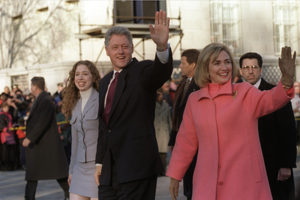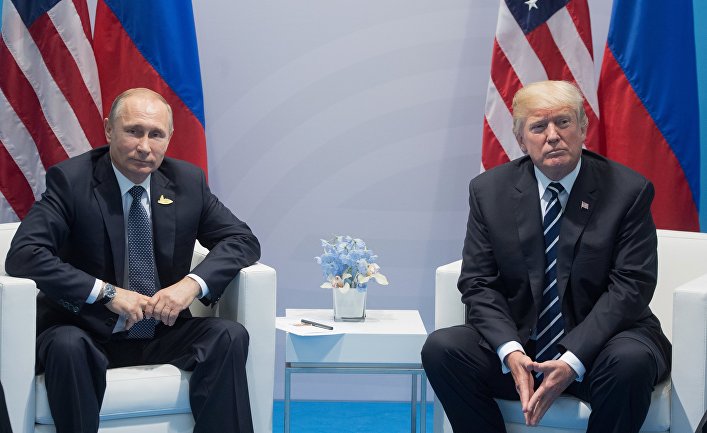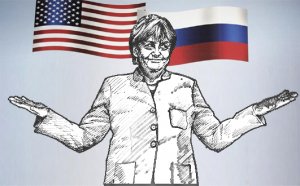Robert Parry
Investigative reporter Robert Parry broke many of the Iran-Contra stories for The Associated Press and Newsweek in the 1980s. You can buy his latest book, America’s Stolen Narrative, either in print here or as an e-book (from Amazon and barnesandnoble.com).
Exclusive: Official Washington’s groupthink is that Russian "disinformation” helped elect Donald Trump, but the evidence is actually much stronger that Russian "dirt” was helping Hillary Clinton, reports Robert Parry.
An irony of the escalating hysteria about the Trump camp’s contacts with Russians is that one presidential campaign in 2016 did exploit political dirt that supposedly came from the Kremlin and other Russian sources. Friends of that political campaign paid for this anonymous hearsay material, shared it with American journalists and urged them to publish it to gain an electoral advantage. But this campaign was not Donald Trump’s; it was Hillary Clinton’s.
And, awareness of this activity doesn’t require you to spin conspiracy theories about what may or may not have been said during some seemingly innocuous conversation. In this case, you have open admissions about how these Russian/Kremlin claims were used.
Indeed, you have the words of Rep. Adam Schiff, the ranking Democratic member of the House Intelligence Committee, in his opening statement at last week’s public hearing on so-called "Russia-gate.” Schiff’s seamless 15-minute narrative of the Trump campaign’s alleged collaboration with Russia followed the script prepared by former British intelligence officer Christopher Steele who was hired as an opposition researcher last June to dig up derogatory information on Donald Trump.
Steele, who had worked for Britain’s MI-6 in Russia, said he tapped into ex-colleagues and unnamed sources inside Russia, including leadership figures in the Kremlin, to piece together a series of sensational reports that became the basis of the current congressional and FBI investigations into Trump’s alleged ties to Moscow.
Since he was not able to go to Russia himself, Steele based his reports mostly on multiple hearsay from anonymous Russians who claim to have heard some information from their government contacts before passing it on to Steele’s associates who then gave it to Steele who compiled this mix of rumors and alleged inside dope into "raw” intelligence reports.
Lewd Allegations
Besides the anonymous sourcing and the sources’ financial incentives to dig up dirt, Steele’s reports had numerous other problems, including the inability of a variety of investigators to confirm key elements, such as the salacious claim that several years ago Russian intelligence operatives secretly videotaped Trump having prostitutes urinate on him while he lay in the same bed in Moscow’s Ritz-Carlton used by President Obama and First Lady Michelle Obama.
That tantalizing tidbit was included in Steele’s opening report to his new clients, dated June 20, 2016. Apparently, it proved irresistible in whetting the appetite of Clinton’s mysterious benefactors who were financing Steele’s dirt digging and who have kept their identities (and the amounts paid) hidden. Also in that first report were the basic outlines of what has become the scandal that is now threatening the survival of Trump’s embattled presidency.
But Steele’s June report also reflected the telephone-tag aspects of these allegations: "Speaking to a trusted compatriot in June 2016 sources A and B, a senior Russian Foreign Ministry figure and a former top level Russian intelligence officer still active inside the Kremlin respectively, the Russian authorities had been cultivating and supporting US Republican presidential candidate, Donald TRUMP for a least 5 years.
"Source B asserted that the TRUMP operation was both supported and directed by Russian President Vladimir PUTIN. Its aim was to sow discord and disunity both within the US itself, but more especially within the Transatlantic alliance which was viewed as inimical to Russia’s interests. … In terms of specifics, Source A confided that the Kremlin had been feeding TRUMP and his team valuable intelligence on his opponents, including Democratic presidential candidate Hillary CLINTON, for several years. …
"The Kremlin’s cultivation operation on TRUMP also had comprised offering him various lucrative real estate development business deals in Russia, especially in relation to the ongoing 2018 World Cup soccer tournament. However, so far, for reasons unknown, TRUMP had not taken up any of these.”
Besides the anonymous and hearsay quality of the allegations, there are obvious logical problems, especially the point that five years ago, you could have gotten astronomical odds about Trump’s chances to win the U.S. presidency, although perhaps there is more an astrological explanation. Maybe the seemingly logical Putin went to some stargazing soothsayer to see the future.
There also may have been a more mundane reason why Trump’s hotel deal fell through. A source familiar with those negotiations told me that Trump had hoped to get a half interest in the $2 billion project but that Russian-Israeli investor Mikhail Fridman, a founder of Russia’s Alfa Bank, balked because Trump was unwilling to commit a significant investment beyond the branding value of the Trump name.
Yet, one would assume that if the supposedly all-powerful Putin wanted to give a $1 billion or so payoff to his golden boy, Donald Trump, whom Putin just knew would become President in five years, the deal would have happened.
Whetting the Appetite
Despite the dubious quality of Steele’s second- and third-hand information, the June report appears to have won the breathless attention of Team Clinton. And once the bait was taken, Steele continued to produce his conspiracy-laden reports, totaling at least 17 through Dec. 13, 2016.
The reports not only captivated the Clinton political operatives but influenced the assessments of Obama’s appointees in the U.S. intelligence community. In the last weeks of the Obama administration, I was told that the outgoing intelligence chiefs had found no evidence to verify Steele’s claims but nevertheless believed them to be true.
Still, a careful analysis of Steele’s reports would have discovered not only apparent factual inaccuracies, such as putting Trump lawyer Michael Cohen at a meeting with a Russian official in Prague (when Cohen says he’s never been to Prague), but also the sort of broad conspiracy-mongering that the mainstream U.S. news media usually loves to ridicule.
For instance, Steele’s reports pin a range of U.S. political attitudes on Russian manipulation rather than the notion that Americans can reach reasonable conclusions on their own. In one report dated Sept. 14, 2016, Steele claimed that an unnamed senior official in President Vladimir Putin’s Presidential Administration (or PA) explained how Putin used the alleged Russian influence operation to generate opposition to Obama’s Pacific trade deals.
Steele wrote that Putin’s intention was "pushing candidate CLINTON away from President OBAMA’s policies. The best example of this was that both candidates [Clinton and Trump] now openly opposed the draft trade agreements, TPP and TTIP, which were assessed by Moscow as detrimental to Russian interests.”
In other words, the Russians supposedly intervened in the U.S. presidential campaign to turn the leading candidates against Obama’s trade deals. But how credible is that? Are we to believe that American politicians – running the gamut from Senators Bernie Sanders and Elizabeth Warren through former Secretary of State Hillary Clinton to President Donald Trump – have all been tricked by the Kremlin to oppose those controversial trade deals, which are also broadly unpopular with the American people who are sick and tired of trade agreements that cost them jobs?
Steele’s investigative dossier suggests that we can’t really think for ourselves. We are all Putin’s puppets.
Greater Skepticism?
Normally, such a ludicrous claim – along with the haziness of the sourcing – would demand greater skepticism about the rest of Steele’s feverish charges, but a curious aspect of the investigations into Russia’s alleged "meddling” in Election 2016 is that neither Steele nor the "oppo research” company, Fusion GPS, that hired him – reportedly with funding from Clinton allies – has been summoned to testify.
Usually, official investigations begin with testimony from the people who are making the allegations, so their credibility and motives can be tested in an adversarial setting. Plus, some baseline information should be established: Who, for instance, paid for the contract? How much was the total and how much went to Steele? How much did Steele then pay his Russian contacts and did they, in turn, pay the alleged Russian insiders for information? Or are we supposed to believe that these "insiders” risked being identified as spies out of a commitment to the truth?
None of these answers would necessarily discredit the information, but they could provide important context as to whether this "oppo” team had a financial motive to sex-up the reports to keep Clinton’s friends coming back for more. Arguably the funders of this "oppo” research should be called to testify as well regarding whether they would have kept ponying up more money if Steele’s reports had concluded that there were no meaningful contacts between Trump’s people and the Russians. Were they seeking the truth or just dirt to help Hillary Clinton win?
Since last November’s election, Steele has ducked public inquiries and Glenn Simpson, the former Wall Street Journal journalist who heads Fusion GPS, has refused to divulge who hired his firm or answer other relevant questions. That means we still don’t know which Clinton friends paid for the dirt and how much money was given to subcontractors like Steele and his Russian associates. (One source told me it may have totaled around $1 million.)
According to various press reports, Fusion GPS first worked for a Republican opponent of Trump’s, but then switched over to the Clinton side after Trump won the Republican race. With Steele generating his reports every few days or every few weeks, people close to Clinton’s campaign saw the Russia allegations as a potential game-changer. They reached out to reporters to persuade them to publish Steele’s allegations even if they could not be verified.
Before the election, a longtime Clinton operative briefed me on aspects of Steele’s investigation, including the "golden shower” allegations, and urged me to at least publish the accusations as a rumor citing the fact that some major news organizations were looking into the charges, an offer that I declined.
In a different setting – when Gov. Bill Clinton was seeking the presidency and Republican "oppo” researchers were pushing various wild and salacious allegations about him – the Clinton team dismissed such claims and the motivations of the people behind them as "cash for trash.”
Following the Storyline
Yet, Schiff’s opening statement at the hearing on March 20 relied heavily on Steele’s narrative and the supposed credibility of the ex-British spy and his anonymous Russian sources, even to the point of naming Americans who presumably joined in a scheme to collaborate with the Russians to help rig the U.S. election, an act that some commenters have compared to treason.

President Bill Clinton, First Lady Hillary Clinton and daughter Chelsea parade down Pennsylvania Avenue on Inauguration Day, Jan. 20, 1997. (White House photo)
The California Democrat said, "Russian sources tell [Steele] that [Carter] Page [a Trump foreign policy adviser who made a public trip to Russia in early July 2016] also had a secret meeting with Igor Sechin, CEO of Russian gas giant Rosneft. … According to Steele’s Russian sources, Page is offered brokerage fees by Sechin on a deal involving a 19 percent share of the company.”
These "Russian sources” also tell Steele, according to Schiff, that "the Trump campaign is offered documents damaging to Hillary Clinton, which the Russians would publish through an outlet that gives them deniability, like Wikileaks. The hacked documents would be in exchange for a Trump Administration policy that de-emphasizes Russia’s invasion of Ukraine and instead focuses on criticizing NATO countries for not paying their fare share.”
Schiff continued: "Is it a coincidence that the Russian gas company Rosneft sold a 19 percent share after former British Intelligence Officer Steele was told by Russian sources that Carter Page was offered fees on a deal of just that size? Is it a coincidence that Steele’s Russian sources also affirmed that Russia had stolen documents hurtful to Secretary Clinton that it would utilize in exchange for pro-Russian policies that would later come to pass?”
However, is it also not possible that Steele and his profit-making colleagues made their reports conform to details that already were known or that they had reason to believe would occur, in other words, to match up their claims with independently known facts to give them greater credibility? That is a classic way for conmen to establish "credibility” with marks who are either gullible or simply want to believe.
Also, clever prosecutors in presenting a "circumstantial case” – as Schiff was doing on March 20 – can make innocent coincidences look suspicious. For instance, though Trump’s resistance to escalating tensions with Russia were well known through the primary campaign, Schiff made a big deal out of the fact that Trump’s people opposed a plank in the Republican platform that called for shipping lethal military supplies to Ukraine for the government’s war against ethnic Russian rebels in the east. Schiff presents that as the quo for the quid of the Russians supplying purloined emails from the Democratic National Committee to WikiLeaks (although WikiLeaks denies getting the emails from the Russians).
In his opening statement, Schiff said: "In the middle of July, Paul Manafort, the Trump campaign manager and someone who was long on the payroll of pro-Russian Ukrainian interests, attends the Republican Party convention. Carter Page, back from [a business meeting in] Moscow, also attends the convention.
"According to Steele, it was Manafort who chose Page to serve as a go-between for the Trump campaign and Russian interests. [Russian] Ambassador [Sergey] Kislyak, who presides over a Russian embassy in which diplomatic personnel would later be expelled as likely spies, also attends the Republican Party convention and meets with Carter Page and additional Trump Advisors J.D. Gordon and Walid Phares. It was J.D. Gordon who approved Page’s trip to Moscow.
"Ambassador Kislyak also meets with Trump campaign national security chair and now Attorney General Jeff Sessions. Sessions would later deny meeting with Russian officials during his Senate confirmation hearing. Just prior to the convention, the Republican Party platform is changed, removing a section that supports the provision of ‘lethal defensive weapons’ to Ukraine, an action that would be contrary to Russian interests.
"Manafort categorically denies involvement by the Trump campaign in altering the platform. But the Republican Party delegate who offered the language in support of providing defensive weapons to Ukraine states that it was removed at the insistence of the Trump campaign. Later, J.D. Gordon admits opposing the inclusion of the provision at the time it was being debated and prior to its being removed.”
Problems with the Conspiracy
So, not only is Schiff relying on Steele to provide key links in the conspiracy chain but Schiff ignores the surrounding reality that Trump had long opposed the idea of escalating the confrontation with Russia in Ukraine – as, by the way, did President Obama who resisted pressure to send lethal military hardware to Ukraine.
Nazi symbols on helmets worn by members of Ukraine’s Azov battalion. (As filmed by a Norwegian film crew and shown on German TV)
Plus, Schiff ignores other logical points, including that party platforms are essentially meaningless and that the savvy Putin would not likely take the huge risk of offending the odds-on winner of the presidential race, Hillary Clinton, for something as pointless as a word change in the GOP platform.
There is also the point that if Trump were a true "Manchurian candidate,” he would have taken the more politically popular position of bashing Russia during the campaign and only reverse course after he got into the White House. That’s how the scheme is supposed to work. (And, of course, all embassies including American ones have spies assigned to them, so there is nothing unusual about Ambassador Kislyak presiding at an embassy with spies.)
Other independent-minded journalists have noted various chronological problems with Steele’s narrative, such as Marcy Wheeler at her emptywheel.net Web site.
In other words, there are huge holes in both the evidence and the logic of Schiff’s conspiracy theory. But you wouldn’t know that from watching and reading the fawning commentary about Schiff’s presentation in the mainstream U.S. news media, which has been almost universally hostile to Trump (which is not to say that there aren’t sound reasons to consider the narcissistic, poorly prepared Trump to be unfit to serve as President of the United States).
The journalistic problem is that everyone deserves to get a fair shot from reporters who are supposed to be objective and fair regardless of a person’s popularity or notoriety or what the reporter may personally feel. That standard should apply to everyone, whether you’re a foreign leader despised by the U.S. government or a politician detested for your obnoxious behavior.
There is no professional justification for journalists joining in a TV-and-print lynch mob. We also have seen too often where such wrongheaded attitudes lead, such as to the groupthink that Iraq’s hated dictator Saddam Hussein was hiding WMDs, or in an earlier time to the McCarthyism that destroyed the lives of Americans who were smeared as unpatriotic because of their dissident political views.
So, yes, even Donald Trump deserves not to be railroaded by a mainstream media that wants desperately – along with other powerful forces in Official Washington – to see him run out of town on a rail and will use any pretext to do so, even if it means escalating the risks of a nuclear war with Russia.
And, if mainstream media commentators truly want a thorough and independent investigation, they should be demanding that it start by summoning the people who first made the allegations.







_jpg/250px-ElbeDay1945_(NARA_ww2-121).jpg)









